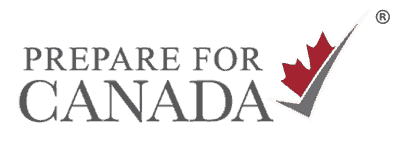
Moving to Canada is a time filled with optimism. It’s also a time when you have to make big decisions, including choosing the region of Canada and the city where you would like to live. Fredericton, New Brunswick, located in Canada’s Atlantic Region is a great city to consider.
Researching the city is vital to help you make the right decision. What’s the job market like for your skills and background? How affordable is housing, including rental or buying a home? What’s the cost of living compared to other cities? Taking the time and effort to gather this information, will help identify if Fredericton is the best city for your needs and goals in Canada.
About Fredericton, New Brunswick
Fredericton is the capital of New Brunswick (NB) and is known for its colonial charm. It’s a quaint city rich in culture and history and combines the comfort of a small town with world-class facilities. Culturally, New Brunswick was first inhabited by Indigenous peoples. New Brunswick is Canada’s only officially bilingual province that blends French and English cultures. While most people speak English in Fredericton, you’ll have a competitive advantage in the job market if you speak both English and French.
Located just outside of Fredericton is Oromocto home to Canadian Forces Base Gagetown. This is Canada’s second-largest military base and its rich history goes back over two hundred years.
Advertisement:
The Greater Fredericton Region includes the City of Fredericton and the outlying communities of the Town of Oromocto, Village of New Maryland, and Hanwell. As one of Canada’s prettiest cities, you’ll find the residential streets lined with beautiful Victorian homes and architecture.
Settling in a smaller city such as Fredericton is something to think about. Many newcomers often land in Canada’s largest cities because of the jobs and services they offer. However, you’ll discover that although Fredericton is a small city, it provides many of the same amenities and services. As the “start-up capital of Canada”, it attracts entrepreneurs, skilled professionals, international students, and people who value a cleaner, greener life. And, it is more affordable than major cities like Toronto and Vancouver.
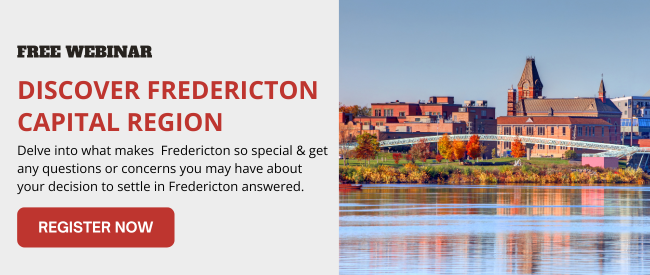
How Many People Live in Fredericton, New Brunswick?
The population of Fredericton, NB is 108,610 (source: 2021 Canada Census). By Canadian standards, it is a small city. The diverse population includes Chinese, South Asian, Arab, Korean, Southeast Asian, and West Asian nationalities.
Related Post:
Fredericton, New Brunswick, Immigrants and Housing
How to Find a Job & Build a Career in Fredericton
Fredericton’s Local Economy
While government services make up a large percentage of Fredericton jobs, Information and Communications Technology (ICT), business, and research are key drivers of the economy. Fredericton is the start-up capital of Canada, making it a choice destination for talented immigrants, and the #1 micro-city in North America for business (fDI Magazine).
Advertisement:
Fredericton has been recognized as one of the Intelligent Community Forum’s Smart21 Communities of the Year in 2020, 2022, and 2022. There is also a high concentration of knowledge industry companies because of its highly educated talent pool and well-regarded universities. You’ll find industries related to:
- Biotech
- Clean technology
- Aerospace and defense.
Watch the video now to learn more about the leading industries in Fredericton:
Fredericton also has the most engineers per capita in all of Canada. It’s an innovative smart city and a national leader in cybersecurity, IT, financial services, agriculture, and agritech.
Other sectors include:
- Government services
- Natural resources
- Education
- Health and social services
- Retail trade
- Accommodation and hospitality.
The Greater Fredericton Region has also developed export-focused engineering services and information technology clusters that continue to attract new talent.
Major Employers in Fredericton
Fredericton is home to employers in many industries. There are some of the top employers in the region:
- Salesforce
- Irving
- Mariner Innovations
- Cvent
- Skillsoft.
Career Pathways in Fredericton
Fredericton has a supportive business community that invests in helping newcomers and permanent residents find careers. To search for potential job opportunities that match your skills and experience you can check out:
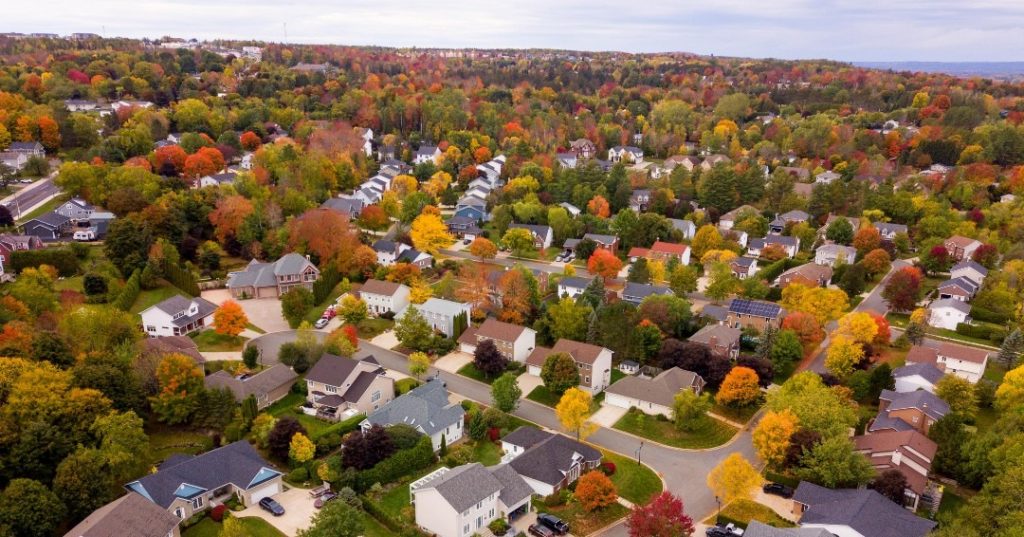
The Fredericton Housing Market
It’s important to consider where you want to live in the city and what amenities you want to be close to. Choosing where to live is a big decision. Before choosing a neighbourhood, assess what’s important to you. For example, do you want to be close to schools, work, hospitals, shopping, etc?
If you don’t have a car, check out the cost and availability of public transit.
Is Housing Expensive in Fredericton, New Brunswick?
Fredericton is an affordable city and offers a range of real estate options for homeowners and renters. However, the city has seen average home prices rising significantly. This growth is due to an influx of out-of-province buyers and a dwindling housing inventory. However, despite these increasing prices, average rent costs in Fredericton are:
- 135.41% lower than in Toronto
- 25.39% lower than Montreal
- 62.73% lower than in Vancouver.
Finding a Place to Rent in Fredericton
Searching online for private market housing is one way to find a home that fits your budget and needs. You can also browse Rentals for Newcomers to search for rental units.
Get more information about renting a home: Renting in Canada: What Newcomers Need to Know
Buying a Home in Fredericton
Buying a home in Fredericton is quite affordable. According to the Fredericton Housing Market Outlook (2025), the median price of a single-family detached home is $359,038.
Compare that to Toronto home prices where the average single-family detached home cost is $1,135,381 or Vancouver at $1,383,501.
Find out more about buying your first home in Canada: First Time Home Buyer: Newcomer Tips
Driving & Public Transit in Fredericton
Driving in Fredericton, New Brunswick
Most residents use a private car to get around for ease and convenience. While there is a transit system, the service is less frequent than in a large urban city.
If you want to drive a car, it’s vital to know the rules of the road. You can download the New Brunswick Driver’s Handbook Drivers need to understand the basics of road safety. The province has a graduated licencing process.
For information on driving in Canada and how to get a licence, see:
Driving in Canada: 10 Essential Facts to Know.
Driving Test in Canada: A Full Guide
Tips for Winter Driving to Ensure Your Safety
Fredericton Public Transit
Fredericton Transit offers a public transit network for people living in Fredericton and its suburbs. A top priority for Fredericton Transit is to provide transit options to driving by introducing changes to systems and services. The city operates 28 buses on 12 routes that run Monday to Saturday from 6:15 am until 11:00 pm. Find out more about Fredericton Transit fares and schedules.
Community Support for Newcomers
Fredericton continues to attract newcomers by recruiting and retaining international students, and entrepreneurs. The city is also expanding support for broader newcomer groups.
The Multicultural Association of Fredericton is a key contact for newcomers and provides settlement help, employment services, language classes, and connections to community services. Fredericton also has one of the most robust immigrant support systems in Atlantic Canada with programs and services to help you succeed.
Learn more about Services in Canada to Help Newcomers Settle.
Language Support in Fredericton
Many immigrant and community organizations offer free language classes for permanent residents. In New Brunswick, you’ll hear both English and French, so it’s important that you feel comfortable speaking in one or both languages. School boards, universities, community colleges, and settlement agencies offer free language classes. To get your a language assessment for study or work, you can consult either:
Continuum Language Assessment Center.
Many immigrant and community organizations offer free classes for permanent residents to improve English or French language. Learn more about the University of New Brunswick English Language Programme.
Personal Finance & Banking
Managing your finances, savings, and investments is important to new immigrants in Canada. And newcomers to Fredericton have access to banks, credit unions, and financial institutions.
Most banks have programs to help new immigrants open a bank account, get a credit card, mortgage, and get help with other financial products. Visit a local bank branch in person or online to get started. All banks require proof of residence before you open a bank account.
Get more banking tips for newcomers:
Top 10 Financial Steps to Take Before You Leave for Canada
Move to Canada | Transferring Cash & Valuables
Open a Bank Account Before Arriving in Canada
Fredericton’s Education System
The Government of New Brunswick manages the school system and is responsible for all levels including elementary, secondary and post-secondary education.
Elementary and Secondary Education
The public school system in New Brunswick provides free education to children aged five years up to youth aged 17 to 18 years. Children start:
- Elementary school (Kindergarten to grade 5) at five years of age
- Middle school (Grade 6 to grade 8) at about 11 years of age
- High school (Grade 9 to Grade 12) at about 14 years of age.
The province has English and French school systems to support New Brunswick’s bilingual culture. The Greater Fredericton region has two school districts:
Anglophone West School District that governs English schools, and
District Scholaire Francophone Sud that governs French schools.
You can choose whether your child attends a school in an English or French district. However, your child must attend the French or English school closest to your residence.
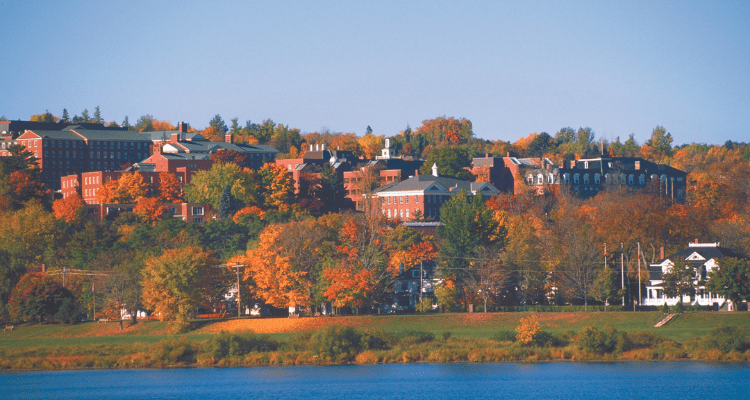
Post-Secondary Education
Many international students move to Fredericton to study. Along with its reputation as a smart city, Fredericton has excellent education and research facilities. The city is home to four universities:
The University of New Brunswick (UNB): boasts a world-class program with a small-university experience. It offers a range of undergraduate and graduate programs, continuing education, and online learning options. It is the oldest English-language university in Canada and among the oldest universities in North America. UNB also provides an English Language Programme (ELP) designed to help non-English speakers function in an English setting.
St. Thomas University (STU): is a small Catholic, liberal arts university that welcomes students and faculty from all faiths.
The University of Fredericton (UFRED): is fully online and offers degree, certificate, diploma, and degree programs. This school is ideal for professionals seeking to advance their knowledge while balancing their busy personal and professional lives.
Yorkville University: delivers online education and is ranked in the top 10 online universities in Canada.
There are also many college and private training schools such as New Brunswick Community College, The New Brunswick College of Craft and Design, and the Maritime College of Forest Technology.
Read more about education in Canada:
Schooling in Canada | A Look at the Education System
Higher Education Offers Benefits to Newcomers
Where to Get Medical Care in Fredericton
Canadians value the high-quality healthcare that they can access. And in Fredericton, it’s no different. Through the New Brunswick Medicare system, citizens and permanent residents benefit from Canada’s universal healthcare. When you arrive and apply for insured medical services, you’ll receive a Medicare card. You present the card when you visit any hospital, doctor, or clinic for medical services.
The province is covered by two health care regions: Vitalité Health Network and Horizon Health Network.
For prescription drugs and some services that the province does not cover, you can pay for additional health insurance plans. Some people have third-party health insurance through their employer benefits packages. When you receive a job offer from an employer, they will tell you what medical benefits they cover on top of your Medicare plan.
How to Find a Family Doctor in Fredericton
Finding a family doctor to access healthcare is a vital to ensure your well-being. But, finding a family doctor can be difficult. So start searching as soon as you arrive and don’t wait until you are sick.
To find a doctor, you can use Patient Connect NB. You may be put on a waitlist until a doctor is available. While you wait for a family doctor, you can go to a general non-emergency walk-in clinic.
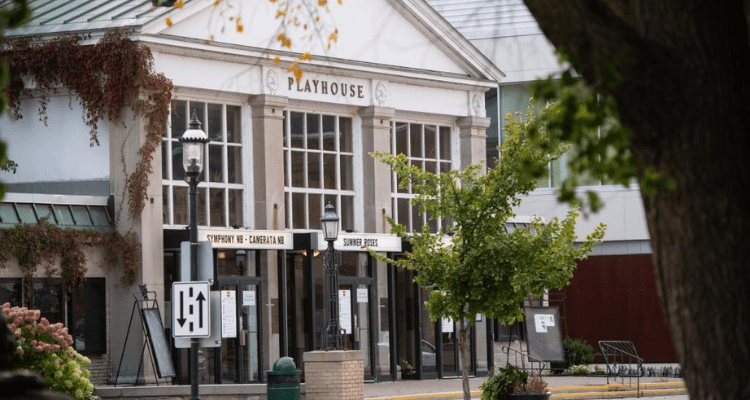
What is Day-to-Day Life Like in Fredericton?
Things to Do in Fredericton
Fredericton is a vibrant community and a rewarding place to live. You’ll find culture and art, festivals and events, green space, and recreational activities that make the city so liveable.
Public Spaces & Attractions
With its rich heritage and culture, you can visit many historic districts that showcase theatre, concerts, and architecture. Or, shop for local food at the Boyce Farmers Market. The market is one of Canada’s top 10 community markets.
Restaurants & Nightlife
The city offers everything from sidewalk patios, and rooftop bars, to microbreweries. The city is known for its great festivals including the Harvest Festival and Frostival winter carnival.
Nature & Natural Landscapes
If you love the outdoors, Fredericton offers beautiful scenery and recreation options.
The beautiful Saint John River flows through the center of the city. Along the river, there’s a network of over 88 km of wooded paths. So you can enjoy nature and activities such as cycling, walking, running, or cross-country skiing along the tranquil trails that connect to the Greater Trans Canada Trail System.
Odell, Carelton and Wilmot parks are great places to enjoy a picnic.
Swimmers can enjoy a freshwater dip at Killarney Lake or kayak, canoe, or paddleboard along the majestic Saint John River.
Culture & Diversity in Fredericton
Diversity
According to 2021 Canada census data, 8.9% of the population were foreign-born. The top three birthplaces among immigrants in Fredericton were the United Kingdom, United States of America, and China. Other birthplaces include Philippines, India, and Syria.
Places of Worship
In Canada, religious freedom is an important value and right. You can find a church or religious organization here.
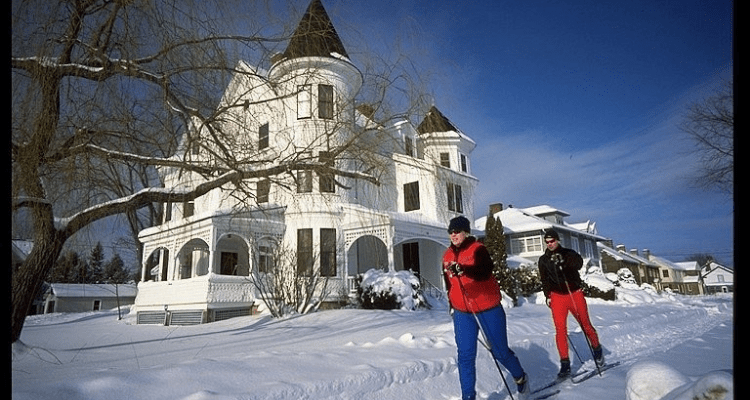
The Weather in Fredericton
Fredericton is located inland from the Atlantic Ocean. So it has higher summer temperatures and lower winter temperatures than coastal locations in New Brunswick. It has a sunny climate with a yearly average of 2,000 hours of sunshine.
Throughout the year, the temperature varies from -14 °Celcius to 26 °C. It is rarely below -23 °C or above 30 °C.
Spring is a rainy season with an average temperature of 12°C in March, April, and early May.
While summer begins on June 21, you can expect warm weather from May to September with an average daily high temperature of 20 °C. The hottest month is July with an average temperature of 25 °C and a low of 15 °C.
The weather cools in the fall with rain. Average temperatures are about 10°C to 12°C.
Winter: In the winter snow is common from December to March. It’s cold and snows often in winter from December to March. Snow stays on the ground for weeks or months. The temperature is usually below 0°C from December to February, day and night. Temperatures can drop below -25°C.
Common Questions Immigrants Ask About Living in Fredericton
Is Fredericton a Good Location for Immigrants?
Yes! Over the past 10 years, Fredericton has welcomed thousands of new immigrants. Over 6.8% of the population are immigrants who moved to Fredericton from more than 50 countries.
You can connect with community organizations that offer language training, settlement services, job search services, business support, and family programs. These services make it easier to adapt to life in Fredericton. The City of Fredericton actively works to attract newcomers to build and grow their community.
Is Moving to Fredericton Worth it?
Whether you’re an international student, entrepreneur, or professional this city is worth exploring. It offers diverse jobs, a quality community, and affordable housing.
What Are the Advantages and Disadvantages of Living in Fredericton?
Any city in Canada will have advantages and disadvantages. Fredericton is a family-friendly city with residential real estate prices that are much lower than other Canadian cities. Food prices in Fredericton are higher than the national average, but you can stretch money further with their lower real estate prices.
While you may need a car in Fredericton, public transit is an important priority for the city.
It’s a safe and ideal city to raise a family and great for professionals or students. And you can move from the bustling downtown area to tranquil parks in minutes.

